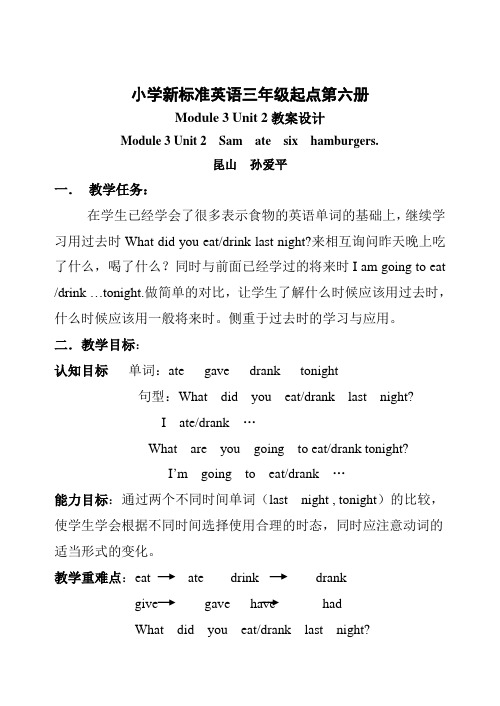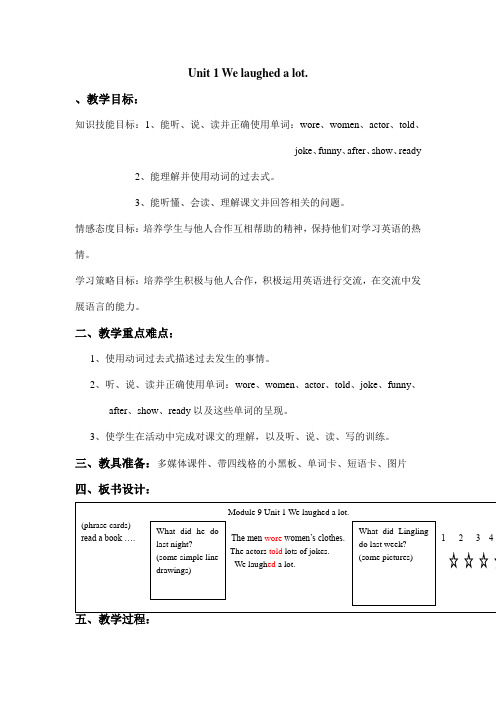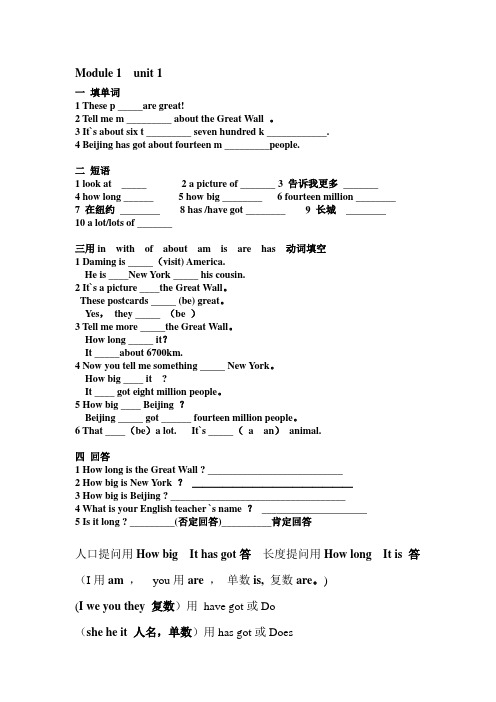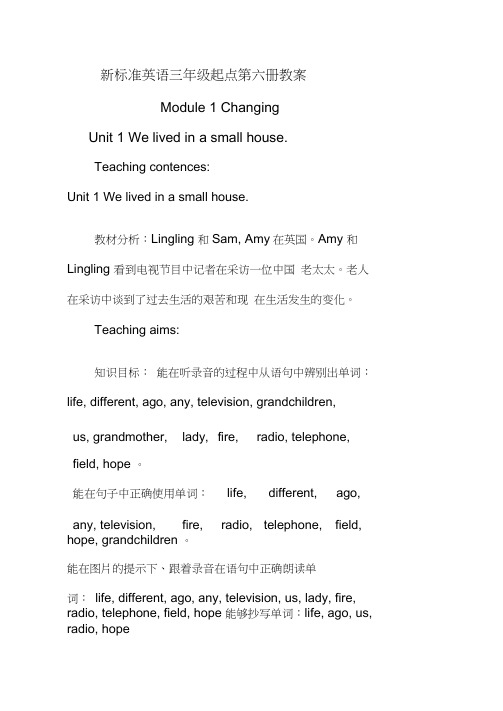新标准英语第六册 模块3 Unit 1
- 格式:ppt
- 大小:214.00 KB
- 文档页数:9

小学新标准英语三年级起点第六册Module 3 Unit 2教案设计Module 3 Unit 2 Sam ate six hamburgers.昆山孙爱平一.教学任务:在学生已经学会了很多表示食物的英语单词的基础上,继续学习用过去时What did you eat/drink last night?来相互询问昨天晚上吃了什么,喝了什么?同时与前面已经学过的将来时I am going to eat /drink …tonight.做简单的对比,让学生了解什么时候应该用过去时,什么时候应该用一般将来时。
侧重于过去时的学习与应用。
二.教学目标:认知目标单词:ate gave drank tonight句型:What did you eat/drank last night?I ate/drank …What are you going to eat/drank tonight?I’m going to eat/drank …能力目标:通过两个不同时间单词(last night , tonight)的比较,使学生学会根据不同时间选择使用合理的时态,同时应注意动词的适当形式的变化。
教学重难点:eat ate drink drankgive gave have hadWhat did you eat/drank last night?I ate/drank …教具准备:课件,图片,单词卡片等。
教学活动:一.Warming-upChant: Noodles and rice are very very nice.(师生边唱边做动作。
)这是一首学生们已经学会的关于食物的儿歌。
在课的开始与学生们一起说唱,既可以作为学生的课前热身,使学生可以很快地进入到英语学习的氛围中,又复习了一些表示食物的单词,可为本课的学习做铺垫,可谓一举两得。
二.Presentation1)教师引导: What are we going to learn today?T利用课件导入: What can you see in the pictures?(课件中不停闪现多种食物类的单词,吸引学生的注意力,调动学生记忆单词的能力。

Unit 1 We laughed a lot.
、教学目标:
知识技能目标:1、能听、说、读并正确使用单词:wore、women、actor、told、
joke、funny、after、show、ready
2、能理解并使用动词的过去式。
3、能听懂、会读、理解课文并回答相关的问题。
情感态度目标:培养学生与他人合作互相帮助的精神,保持他们对学习英语的热情。
学习策略目标:培养学生积极与他人合作,积极运用英语进行交流,在交流中发展语言的能力。
二、教学重点难点:
1、使用动词过去式描述过去发生的事情。
2、听、说、读并正确使用单词:wore、women、actor、told、joke、funny、
after、show、ready以及这些单词的呈现。
3、使学生在活动中完成对课文的理解,以及听、说、读、写的训练。
三、教具准备:多媒体课件、带四线格的小黑板、单词卡、短语卡、图片
四、板书设计:。

第一模块changing 变化It’s a programme about China.这是一个关于中国的节目。
Come and watch.过来看看!I’m coming.我就来。
Life was very different in China many years ago.许多年前中国的生活非常不同。
How was it different? 过去是怎样的?There weren’t any buses. 没有公共汽车。
There weren’t any televisions. 没有电视机。
We lived in a small house. 我们住在一个很小的房子里。
We didn’t have enough food.我们没有足够的食物。
How about now? 现在呢?There are a lot of buses and cars有许多公共汽车和小轿车。
We live in a big house. 我们住在大房子里。
We have got lots of food. 我们有很多的食物。
I watch TV every day. 我每天看电视。
Y esterday I watched TV with my grandchildren.昨天我和我的孙子们一起看电视。
Thank you for talking to us.谢谢您给我们讨论这些。
China is changing.中国正在变化。
She didn’t have a television.她没有电视机。
I watched a television programme about China.我看了一个关于中国的电视节目。
An old lady talked about her life many years ago.一位老夫人讨论了她很多年前的生活。
She cooked on a fire. 她在炉火上做饭。
She worked in the fields. 她在地里干活。

一填单词1 These p _____are great!2 Tell me m _________ about the Great Wall 。
3 It`s about six t _________ seven hundred k ____________.4 Beijing has got about fourteen m _________people.二短语1 look at _____2 a picture of _______3 告诉我更多_______4 how long ______5 how big ________6 fourteen million ________7 在纽约________ 8 has /have got ________ 9 长城________10 a lot/lots of _______三用in with of about am is are has 动词填空1 Daming is _____(visit) America.He is ____New York _____ his cousin.2 It`s a picture ____the Great Wall。
These postcards _____ (be) great。
Yes,they _____ (be )3 Tell me more _____the Great Wall。
How long _____ it?It _____about 6700km.4 Now you tell me something _____ New York。
How big ____ it ?It ____ got eight million people。
5 How big ____ Beijing ?Beijing _____ got ______ fourteen million people。
6 That ____(be)a lot. It`s _____(a an)animal.四回答1 How long is the Great Wall ? ___________________________2 How big is New York ?________________3 How big is Beijing ? ___________________________________4 What is your English teacher `s name ?_____________________5 Is it long ? _________(否定回答)__________肯定回答人口提问用How big It has got答长度提问用How long It is 答(I用am,you用are,单数is, 复数are。

新标准大学英语3U N I T1-W e a r e a l l d y i n g原文+译文(总7页)本页仅作为文档封面,使用时可以删除This document is for reference only-rar21year.MarchWe are all dying我们都在走向死亡have some good news and some bad news for you (as the joke goes). The bad news – and I'm very sorry to be the bearer – is that we are all dying. It's true. I've checked it out. In fact, I've double – and triple-checked it. I've had it substantiated and, well, there's no easy way to say it. we are dying. It's something that I always kind of knew, but never really chose to think about too much. But the fact is, within the next 70 or 80 years – depending on how old you are and how long you last – we are all going to be either coffin dwellers or trampled ash in the rose garden of some local cemetery. We may not even last that long. After all, we never quite know when the hooded, scythe-carrying, bringer-of-the-last-breath might come-a-calling. It could be sooner than we'd like. I have watched death from the sidelines, quite recently in fact, and nothing underlines the uncertainty and absolute frailty of humanity like the untimely exit of a friend.我给你带来一条好消息,还有一条坏消息(正如笑话所说的)。

新标准英语三年级起点第六册教案Module 1 ChangingUnit 1 We lived in a small house.Teaching contences:Unit 1 We lived in a small house.教材分析:Lingling 和Sam, Amy在英国。
Amy 和Lingling 看到电视节目中记者在采访一位中国老太太。
老人在采访中谈到了过去生活的艰苦和现在生活发生的变化。
Teaching aims:知识目标:能在听录音的过程中从语句中辨别出单词:life, different, ago, any, television, grandchildren,us, grandmother, lady, fire, radio, telephone, field, hope 。
能在句子中正确使用单词:life, different, ago, any, television, fire, radio, telephone, field, hope, grandchildren 。
能在图片的提示下、跟着录音在语句中正确朗读单词:life, different, ago, any, television, us, lady, fire, radio, telephone, field, hope 能够抄写单词:life, ago, us, radio, hope情感目标:使学生养成观察生活、热爱生活的良好品质,启发学生要有上进心和责任感为建设更美好的祖国及家园而奋斗。
能力目标:能在图片的帮助下听懂课文中的录音材料。
能运用所学习的语句看图说出图中的变化。
能借助图片读懂课文中谈论过去和现在生活所使用的句子;能读懂Lingling的信;能够在读词的过程中体会字母组合ai, ay, al, au, ar 在单词中的发音。
能用课文中所学语言看图完成句子:Ma nyyears ago, there weren 't . We lived . Now, thereare .We live . ______Teach ing objectives:1. Words and phrases: life, different, ago, any,televisi on, us,gran dchildre n, lady.2. Sentences: There weren' t any buses. livedWe in a small house.There are lots of buses and cars. Welive in a big house.3. Grammar: Compare the life.教学难点:Sentences: There weren 't any buses. We lived in a small house.Grammar: Compare the life. Teaching properties: cards, pictures, Tape-recorder.教学方法:listen to the tapes. Group work. Using PPT and cards.学法指导:积极与他人合作,共同完成学习任务;主动运用所学容进行练习和实践;积极运用所学英语进行表达和交流。
新标准小学英语第6册UnitIMaybel ' llgotothezoo.教案三年级英语教案unitl模块整体分析amy dami ng分别计划周末要去动物园和农场,并各自预想自己将要见到的动物。
谈论将来发生的事情。
本模块主要学习一般将来时的一般疑问句及回答:will…? yes,…will. /no, …won及特殊疑问句.what will you…?及其回答we' II通过本课的学习,使学生在英语学习中获得快乐的学习体验,并用本课句型与他人交流各自将要做的事情,让学生做周末活动小调查等,以巩固一般将来时态的句子的使用。
教案module 3 unit 1 maybe i ' ll go to the zoo.一、教学目标与要求1、知识与能力目标能够听说读写下列句子:★ we' ll see lio ns and tigers.★ will sam go, too? yes, he will.★will you go too, dam ing?★no, i won ' t.能听说读写的词语:will, won ' t, tiger, lion, school, zoo, park能听说读下列句子△ i /she/he won ' t …who will …where dose …live?is there…there并能用学过的句子进行询问、交流各自将要做的事情,例如到哪去,干什么?用于表达将要上的课程等。
2、情感态度目标培养学生的表达及交际能力。
使学生在英语学习中获得快乐的学习体验。
二、教学重点及难点一般将来时态的一般疑问句的使用及回答:will…? yes,…will./no, …won t.三、课前准备tape\tv\headdress\cards textbook/activitybook四、教学过程step 1 warm upgood morning, boys and girls.。
Catching Crabs1 In the fall of our final year, our mood changed. the relaxed atmosphere of the preceding summer semester, the impromptu ball games, the boating on the Charles River, the late-night parties had disappeared, and we all started to get our heads down, studying late, and attendance at classes rose steeply again. We all sensed we were coming to the end of our stay here, that we would never get a chance like this again, and we became determined not to waste it. Most important of course were the final exams in April and May in the following year. No one wanted the humiliation of finishing last in class, so the peer group pressure to work hard was strong. Libraries which were once empty after five o'clock in the afternoon were standing room only until the early hours of the morning, and guys wore the bags under their eyes and their pale, sleepy faces with pride, like medals proving their diligence.大学最后一年的秋天,我们的心情变了。
Module1Unit1SheShe’’s very nice. Hello.These are my friends.This is Maomao.She’s very nice.She always helps people.But she’s a bit shy.This is Xiaoyong.He’s very clever.He can make e-cards.But he’s a bit quiet.I’ve got another friend.He’s very loud.And he’s very,very naughty.It’s me!Your friend,Parrot.第一模块第一单元她非常友好。
你好。
这些是我的朋友们。
这是毛毛。
她非常友好。
她总是帮助人们。
但是她有一点儿害羞。
这是小勇。
他非常聪明。
他能制作电子贺卡。
但是他有一点儿安静。
我有另一个朋友。
他非常吵闹。
和他非常非常淘气。
它是我!你们的朋友,Parrot。
Unit2I’m going to help her.Activity1Parrot:My name’s Parrot.I’m helpful.This little girl can’t do her Maths.I’m going to help her.Girl:What’s ten plus eleven?Parrot:What’s ten plus ten?Girl:Twenty.Parrot:And one more?Girl:It’s twenty-one.Thank you,Parrot.第二单元我打算帮助她。
P:我的名字是Parrot。
我是有帮助的。
这个小女孩不会做她的数学题。
我打算帮助她。
G:十加十一等于几?P:十加十等于几?G:二十。
P:再加一个呢?G:是二十一。
谢谢你,Parrot。
Module2Unit1It It’’s very long. Look at this book.It’s about London.I’m from London.This river is very wide.And it’s very long.It’s the River Thames.It’s very tall.What is it?This is Big Ben.It’s a very old clock.And look at this big wheel.It’s very high.It’s new. It’s the London Eye.Eye?Like my eyes?Yes.It’s a big,round eye!Ahh!第二模块第一单元它非常长。